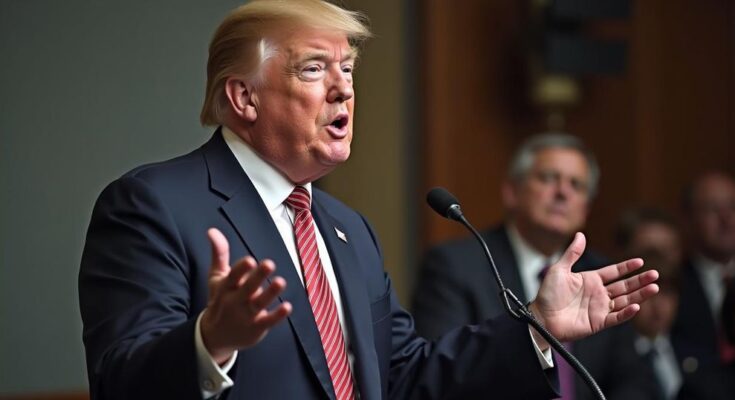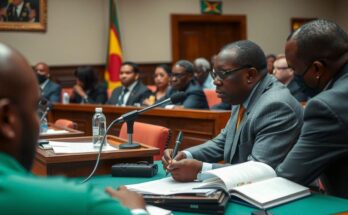Republican House Speaker Mike Johnson claimed, without evidence, that cheating will occur in the upcoming 2024 election and alleged non-citizen voting, echoing past statements made by Donald Trump. His remarks prompted a discussion on the legality of these claims and the integrity of the electoral process, with significant criticism from media and political figures regarding the reliability of such assertions. Johnson’s insistence on requiring proof of citizenship for voter registration further complicates ongoing discussions about voter access and election legitimacy.
In a recent discussion on CBS’s Face the Nation, Republican House Speaker Mike Johnson made speculative assertions regarding potential cheating in the upcoming 2024 election, specifically alleging that non-citizens might participate in the voting process. His claims echoed unfounded allegations propagated by former President Donald Trump during the previous election cycle. Johnson stated, “I think there is going to be some cheating in this election,” further asserting, “I think non-citizens are going to vote.” These remarks prompted moderator Margaret Brennan to remind him that current law prohibits non-citizens from voting in federal elections. Johnson contended, however, that some states are failing to enforce citizenship verification during voter registration, suggesting that this leniency could facilitate illegal voting. Johnson referenced Virginia Governor Glenn Youngkin’s efforts to clean up voter rolls, despite recent legal action by the Justice Department challenging Virginia’s practices as potentially illegal under federal election law. Brennan pointed out the inconsistency in Johnson’s narrative, stating, “you both… said that you do believe that states have taken measures that will help the integrity of this election, and then you just also seem to undermine confidence in the integrity of the state elections.” In his interview, Johnson expressed conspiracy theories surrounding immigration and voter representation, alleging that Democrats had purposely opened borders to bolster their voter base. Brennan reiterated the illegality of non-citizen voting, yet Johnson asserted that new legislation, termed the SAVE Act, could reinforce current laws by requiring proof of citizenship for voter registration, a proposal resisted by Democrats due to concerns over voter suppression. When asked about the potential for unrest akin to the January 6th Capitol riots in 2025, Johnson expressed optimism, stating, “I don’t think we’ll see anything like that. I certainly pray and hope that’s true,” while affirming, “we’re going to have the peaceful transition of power.” However, he hesitated to guarantee that lawmakers would not challenge the election outcome. Former Representative Liz Cheney voiced her apprehensions regarding Johnson’s reliability, claiming, “I do not have faith that Mike Johnson will fulfill his constitutional obligations.” She emphasized the importance of Republican control over the House leading into the 2025 election cycle. Despite his public assertions regarding voter integrity, Johnson has placed conditions on certifying any election results involving Vice President Harris, stipulating that he would only certify outcomes he deems “free, fair and legal.” In conclusion, Johnson’s recent comments on voter integrity and election security appear to perpetuate unfounded concerns about electoral fraud and have raised alarms among critics regarding his commitment to upholding the electoral process should a Democratic candidate prevail in the upcoming election.
The discussion about election integrity has been a contentious issue in American politics, particularly following the 2020 presidential election which saw numerous claims of widespread voter fraud, none of which were substantiated. Allegations regarding non-citizen voting have surfaced periodically, contributing to the national discourse on voter restrictions and electoral laws. The National Voter Registration Act includes provisions to maintain accurate voter rolls, and debates surrounding these regulations often lead to varied interpretations and political ramifications. Johnson’s remarks can be contextualized within a broader narrative that questions election outcomes and legitimacy, particularly among certain factions of the Republican Party, drawing criticism from peers and political analysts alike.
In summary, Speaker Mike Johnson’s recent assertions about potential election cheating and non-citizen voting reflect a continued trend of unfounded claims within political discourse. His remarks have been met with pushback from moderators and political figures, underscoring concerns about the implications such rhetoric may have on public confidence in the electoral process. With upcoming elections, the debate surrounding voter integrity and associated legislation will likely remain a focal point of contention among lawmakers and constituents alike.
Original Source: www.rollingstone.com




